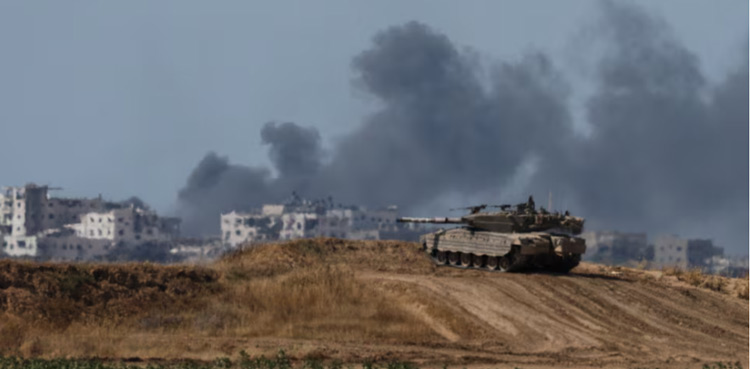
Israeli air strikes killed at least 35 Palestinians and wounded dozens in an area in the southern Gaza Strip city of Rafah designated for the displaced, Palestinian health and civil emergency service officials said.
The Israeli military said its air force struck a Hamas compound in Rafah and that the strike was carried out with “precise ammunition and on the basis of precise intelligence.” It took out Hamas’ chief of staff for the West Bank and another senior official behind deadly attacks on Israelis, it said.
“The IDF is aware of reports indicating that as a result of the strike and fire that was ignited several civilians in the area were harmed. The incident is under review.”
The spokesman for the health ministry in the Hamas-run Gaza, Ashraf Al-Qidra, said 35 people were killed and dozens others, most of them women and children, were wounded in the attack.
The strike took place in Tel Al-Sultan neighborhood in western Rafah, where thousands of people were taking shelter after many fled the eastern areas of the city where Israeli forces began a ground offensive over two weeks ago.
The International Committee of the Red Cross said its field hospital in Rafah was receiving an influx of casualties, and that other hospitals also were taking in a large number of patients.
Senior Hamas official Sami Abu Zuhri described the attack in Rafah as a “massacre”, holding the United States responsible for aiding Israel with weapons and money.
“The air strikes burnt the tents, the tents are melting and the people’s bodies are also melting,” said one of the residents who arrived at the Kuwaiti hospital in Rafah.
Rafah is located about 100 km (60 miles) south of Tel Aviv.
Israel says it wants to root out Hamas fighters holed up in Rafah and rescue hostages it says are being held in the area, but its assault has worsened the plight of civilians and caused an international outcry.
Nearly 36,000 Palestinians have been killed in Israel’s offensive, Gaza’s health ministry says. Israel launched the operation after Hamas attacked southern Israeli communities on Oct. 7, killing around 1,200 people and seizing more than 250 hostages, according to Israeli tallies.
Read more: World Court’s order on Rafah does not rule out entire offensive, Israel says
TRUCE TALKS
Efforts to agree a halt to the fighting and return more than 120 hostages have been blocked for weeks but there were some signs of movement this weekend following meetings between Israeli and U.S. intelligence officials and Qatar’s prime minister.
An official with knowledge of the matter said a decision had been taken to resume the talks this week based on new proposals from Egyptian and Qatari mediators, and with “active U.S. involvement.”
However, a Hamas official played down the report, telling Reuters: “It is not true.”
Netanyahu’s war cabinet would discuss the new proposals, his office said.
A second Hamas official, Izzat El-Reshiq, said the group had not received anything from the mediators on new dates for resuming talks as had been reported by Israeli media.
Reshiq restated Hamas’s demands, which include: “Ending the aggression completely and permanently, in all of Gaza Strip, not only Rafah”.
While Israel is seeking the return of hostages, Netanyahu has repeatedly said the war will not end until Hamas, which is sworn to Israel’s destruction, is eliminated.
AID TRUCKS ENTER GAZA
Israel has faced calls to get more aid into Gaza after more than seven months of a war that has caused widespread destruction and hunger in the enclave.
Khaled Zayed of the Egyptian Red Crescent told Reuters 200 trucks of aid, including four fuel trucks, were expected to enter Gaza on Sunday through Kerem Shalom.
It follows an agreement between U.S. President Joe Biden and Egyptian President Abdel Fattah al-Sisi on Friday to temporarily send aid via the Kerem Shalom crossing, bypassing the Rafah crossing that has been blocked for weeks.
Egypt’s state-affiliated Al Qahera News TV shared a video on social media platform X, showing what it said were aid trucks as they entered Kerem Shalom, which before the conflict was the main commercial crossing station between Israel, Egypt and Gaza.
The Rafah crossing has been shut for almost three weeks, since Israel took control of the Palestinian side of the crossing as it stepped up its offensive.
Egypt has been increasingly alarmed at the prospect of large numbers of Palestinians entering its territory from Gaza and has refused to open its side of the Rafah crossing.
Israel has said it is not restricting aid flows and has opened up new crossing points in the north as well as cooperating with the United States, which has built a temporary floating pier for aid deliveries.
from ARY NEWS https://ift.tt/HueDO6f
via IFTTT

0 Comments